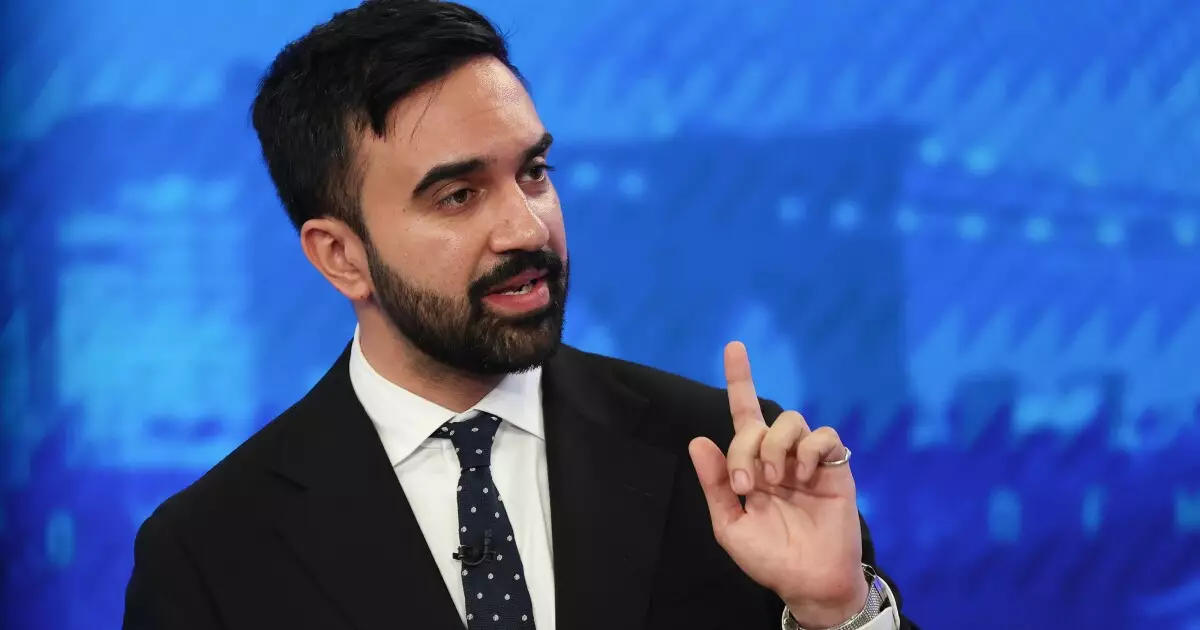In the realm of urban politics, the promise of affordable housing often becomes a siren song, enchanting voters with the prospect of a home for all. Zohran Mamdani, a rising socialist star in New York City’s Democratic mayoral primary, embodies this hope with an ambitious proposal that lays claim to a staggering $70 billion in borrowed debt to address the city’s escalating housing crisis. By advocating for this astronomical sum on top of an existing capital plan, Mamdani’s intentions may seem noble, but they overlook a critical financial reality: the sustainability of such spending.
Mamdani asserts that regardless of the city’s current fiscal challenges, they should plunge into massive debt accumulation, contingent upon state approval. However, in this high-interest-rate environment, this plan seems not only impractical but also dangerously naive. Current debt obligations already consume an estimated $7.7 billion of New York City’s annual budget—money that could otherwise be allocated to essential services. Expanding this fixed cost further risks suffocating other vital areas of expenditure, including public safety, education, and infrastructure maintenance.
A Disregard for Economic Viability
The current financial framework surrounding New York City mandates strict limits on the levels of debt that can be incurred. This guideline exists not merely to stifle ambition but to ensure long-term economic viability. As noted by financial experts, attempts to pile on an additional $70 billion of debt without a concrete strategy for revenue generation pose significant risks. This front-loading of debt contradicts fiscal responsibility and may potentially lead the city toward broader economic instability.
Mamdani’s failure to clearly define how this funding would be sourced raises questions about the feasibility of his plan. Would he reallocate funds from vital public services or jeopardize future investment opportunities? It’s an open question that deserves focus. While addressing the affordable housing crisis should indeed be a priority, doing so through a strategy that leverages debt irresponsibly only shifts the burden to future generations.
The Flawed Foundation of Corporate and Income Taxes
One of Mamdani’s proposed solutions involves raising corporate taxes and introducing a 2% income tax on high earners. While the intention to increase taxation on wealthier residents may seem equitable, it lacks consideration of economic repercussions. High taxes could drive businesses and affluent citizens to relocate, leading to a shrinking tax base and further undermining the very revenues needed to fund his ambitious housing aspirations.
Recent trends indicate that high taxes can dis-incentivize growth and investment. Many individuals and corporations may seek refuge in more economically favorable environments, thereby exacerbating the financial challenges that Mamdani seeks to alleviate. His approach appears centered on a simplistic view of wealth redistribution, failing to contemplate the broader economic dynamics at play.
Addressing the Symptoms, Not the Cause
While the vacancy rates in New York City have dropped dramatically, indicating a pressing need for affordable units, Mamdani’s approach predominantly targets symptom alleviation rather than tackling the root causes of the housing crisis. Simply building more units overlooks key regulatory factors influencing availability, including zoning and land-use policies that may hinder new construction.
Moreover, the current administration’s moves, such as the City of Yes plan pushed by Eric Adams, reflect an evolved understanding of urban development needs, seeking to streamline zoning restrictions and incentivize construction. While Mamdani does not explicitly address these factors, integrating them into his proposal would bolster its viability.
The Potential Political Fallout
Mamdani’s alignment with prominent far-left politicians, such as Alexandria Ocasio-Cortez and Bernie Sanders, raises eyebrows regarding his overall strategic viability within a diverse Democratic voter base. Embracing elements of democratic socialism may resonate with a subset of the electorate; however, there’s a palpable risk of alienating moderate voters who are wary of radical economic shifts.
Importantly, the necessity for state approval for his debt expansion creates a challenging political scenario, as state legislators may not align with Mamdani’s vision—or the risk-laden fiscal philosophy underpinning it. Ultimately, the feasibility of such radical fiscal measures remains contingent not just on popularity but also on the pragmatic realities of governance.
The cycle of proposing eye-catching, ambitious electoral promises without a firm grasp on fiscal realities could undermine public trust and turn palpable dissatisfaction into political backlash. In an era where economic stability is vital, a conservative approach is not just recommended but essential for the future of a city that prides itself as a beacon of opportunity.


Leave a Reply